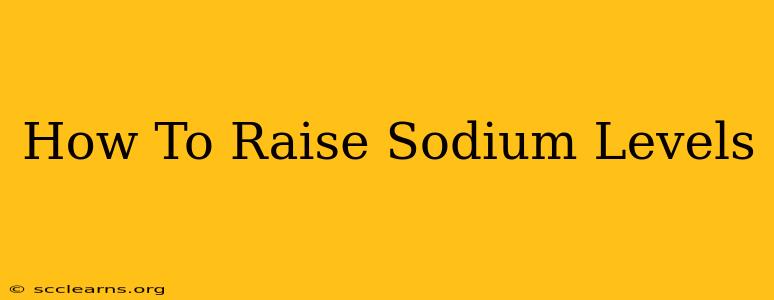Low sodium, or hyponatremia, can be a serious health concern. While it's crucial to maintain a balanced diet and avoid excessive sodium intake, sometimes you may need to increase your sodium levels under the guidance of a doctor. This article is for informational purposes only and should not be considered medical advice. Always consult your doctor before making any significant changes to your diet, especially if you have underlying health conditions.
Understanding Hyponatremia: When Low Sodium Becomes a Problem
Hyponatremia occurs when the sodium concentration in your blood is too low. This can lead to a range of symptoms, from mild nausea and headaches to more serious issues like seizures and coma. Several factors can contribute to low sodium, including:
- Excessive sweating: Prolonged or intense physical activity can lead to significant sodium loss through sweat.
- Diuretic medications: Some medications, particularly those used to treat high blood pressure and heart failure, can increase sodium excretion.
- Kidney problems: Kidney diseases can impair the body's ability to regulate sodium levels.
- Water intoxication: Drinking excessive amounts of water without adequate sodium intake can dilute the sodium in your blood.
- Certain medical conditions: Conditions like adrenal insufficiency and liver cirrhosis can contribute to low sodium levels.
Safe Ways to Increase Sodium Intake
If your doctor determines you have hyponatremia and needs to increase your sodium levels, they'll likely recommend gradual and monitored adjustments. Here are some ways you can safely increase your sodium intake under medical supervision:
1. Dietary Changes: Adding More Salt
The most straightforward method is to add more salt (sodium chloride) to your food. However, it's crucial to do this gradually and in consultation with your doctor to avoid overdoing it. Start by adding a small amount of salt to your meals and gradually increase it as needed, while closely monitoring your sodium levels.
2. Sodium-Rich Foods: A Delicious Approach
Incorporating sodium-rich foods into your diet is a more palatable way to increase your sodium intake. Examples include:
- Processed foods: While generally discouraged due to high fat and sugar content, small amounts of processed foods like canned soups, salted nuts, and cured meats can contribute to your sodium intake (again, moderation is key).
- Salty snacks: Pretzels, potato chips, and salted popcorn can provide a quick sodium boost.
- Broths and soups: Broths, particularly those made with meat or bone, naturally contain higher sodium levels.
- Condiments: Soy sauce, ketchup, and Worcestershire sauce can add a significant amount of sodium to your meals.
3. Oral Rehydration Solutions: A Quick Fix (Under Medical Guidance)
Oral rehydration solutions (ORS) are specifically designed to replace electrolytes, including sodium, lost through dehydration. These should only be used under the direction of a medical professional, as improper use can lead to further complications.
4. Medical Interventions: When Necessary
In severe cases of hyponatremia, your doctor may recommend intravenous (IV) sodium administration in a hospital setting. This is a more direct and rapid method of raising sodium levels but carries risks if not carefully managed.
Monitoring Your Progress
It's essential to regularly monitor your sodium levels while you are trying to increase them. Your doctor will likely advise you on the appropriate frequency and method of testing. Regular monitoring helps ensure that your sodium levels are increasing at a safe and effective rate, preventing potentially serious complications.
Conclusion: Prioritize Medical Guidance
Remember, managing sodium levels requires close medical supervision. This article provides general information about how to increase sodium intake, but it's crucial to consult your doctor before making any changes to your diet, especially if you have hyponatremia. They can help you determine the appropriate level of sodium intake for your specific situation and monitor your progress to ensure your safety and well-being. Improper self-treatment can be harmful; always seek professional medical attention for any health concerns.

